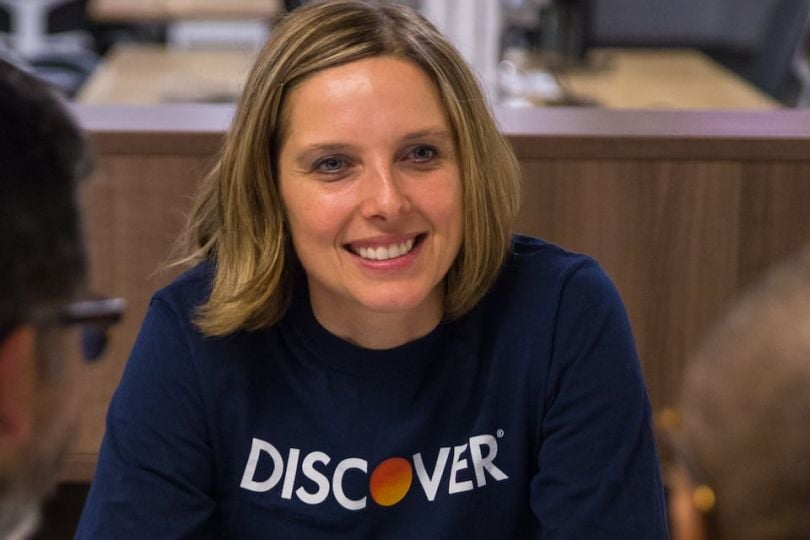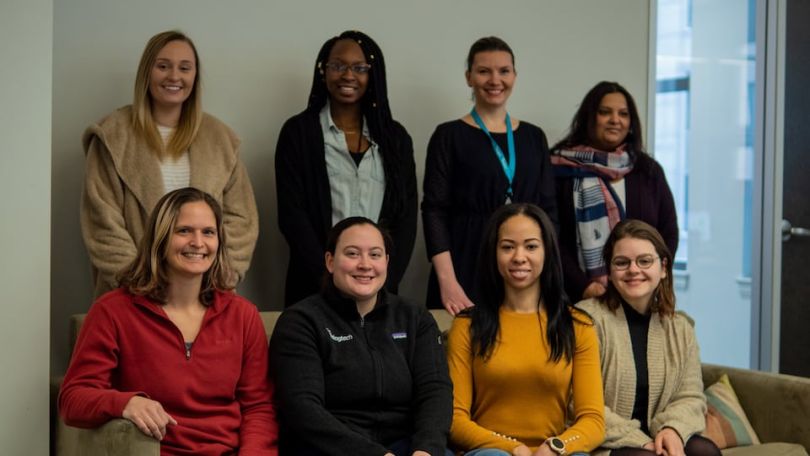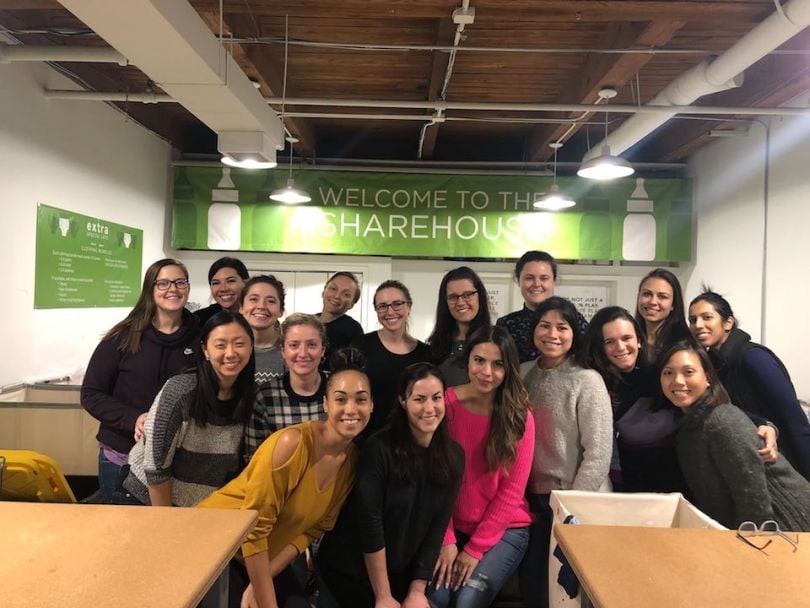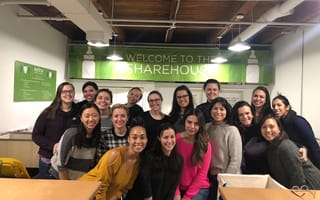It’s not hard to find a good story in the tech industry. The problem is that due to the industry’s staggering gender gap, most of these stories center on the struggles and accomplishments of men. Stories about starting a company after dropping out of college or while working out of a garage command attention, but they’re not the only ones capable of inspiring and exciting the technologists of tomorrow.
In this two-part series, we aim to provide a platform for female Chicago technologists to share the stories of how they got into engineering, the biggest challenges they’ve faced, and their advice to the next generation of women in tech. In part one, you’ll meet a former geologist turned product manager, an academic who fell in love with data science, a senior tech leader who discovered her dream job after the first two companies she worked for folded, and more.
Continue below to read part one of this series.

Discover is a Chicagoland-based company that offers banking, payment solutions and financial services to customers around the globe. Senior Manager of Cloud Engineering Heather Martin became interested in all things computers during high school. Martin has seen both the ups and downs of the tech industry, and to her, the most important thing in navigating it all and building a long career has been to strike a balance and set boundaries.
How did you get into engineering?
I have always been a naturally inquisitive person, and from a young age, my family was certain I was going to pursue a career in law. I was fortunate enough to be accepted into a technical high school with a focus on math and science, which allowed for me to be exposed to a wealth of computer and technical electives. I fell in love with using computers to systematically solve problems and became obsessed with gaining a deeper understanding of how things worked — never mind that some of my obsessions resulted in pulling things apart that I could never quite put back together! I obtained a degree in computer science and have been working in engineering ever since.
Be inquisitive and always willing to reinvent yourself, adapt and change. But above all else, find a way to strike a balance.”
What’s the biggest challenge you’ve faced in your career, and how have you worked to overcome it?
The first two companies I worked for out of college both went out of business. I was working with lifelong friends and was certain I would spend my career at my first employer. I began to wonder if the technology industry was too risky. But I picked myself up and landed an amazing job at Discover that pushed me to new limits, which was both exciting and terrifying. Looking back, I never would have learned as much if I had stayed with my original employer. I can now say I am truly grateful that door closed so that so many more could open.
What advice or tips do you have for women pursuing careers in engineering?
Be a continuous learner. Be inquisitive and always willing to reinvent yourself, adapt and change. But above all else, find a way to strike a balance. The landscape is competitive, and it’s easy to get sucked into doing more to differentiate oneself, but sometimes it is actually okay to slow down. You will be greater if you can set boundaries for yourself. As a female with a family in a male-dominated industry, it has been challenging for me to find that balance without some guilt on both ends. When I have been able to successfully tip the scales equally between career and family, this is when I think I have truly been the greatest asset.

DialogTech’s AI-powered call analytics solutions help companies get a clearer picture of how their marketing efforts are driving inbound calls, and how those conversations impact the customer journey. Senior Product Manager Lori Eich kicked off her tech career after working for three years as a geologist. Eich said going from earth science to engineering was made easier by her willingness to ask questions, learn new things and trust in her problem-solving skills.
How did you get into engineering?
When I was a kid, every answer I ever had to, “What do you want to be when you grow up?” was something related to science or technology. I can’t remember ever seeing myself as anything but “a scientist who does experiments” or “genetic engineer” or “person who builds something awesome.” I’ve always been a problem solver, and even today as an “adult” I spend a lot of my free time playing strategy games and doing puzzles. I studied geology and geophysics in college and grad school, mostly because I like that it combines all of the other sciences into an Earth-sized 3D jigsaw puzzle of plate tectonics.
After pursuing geology for a few years, an opportunity arose to join a software engineering team. I’d taken some computer science courses in college, and was going to be working for a person I really trusted as a mentor, so I jumped in feet first. I eventually pivoted from engineering to product management. I like exploring how my team can use engineering solutions to solve our customers’ problems and thinking about how to make software more functional, usable and useful.
Don’t let the fact that you don’t know a certain coding language or machine learning technique be the thing that keeps you from giving it a shot.”
What’s the biggest challenge you’ve faced in your career, and how have you worked to overcome it?
The biggest challenge I had was jumping into a software engineering role after spending about three years away from writing code. To get myself up to speed quickly, I spent a lot of time walking through my team’s code base to understand the patterns and tools already in place. I also devoted about 10 hours per week to software engineering courses on the MIT EdX platform. Most importantly, I wasn’t afraid to ask questions because I had a good relationship with my mentor. I knew he had confidence in my problem-solving skills, and he knew he could trust me to learn quickly.
What advice or tips do you have for women pursuing careers in engineering?
Your best asset is your ability to solve problems. Don’t let the fact that you don’t know a certain coding language or machine learning technique be the thing that keeps you from giving it a shot. You can learn new tools, techniques and coding languages — but those are all just vehicles for you to exercise your problem-solving skills.

Jellyvision’s software is used by companies to make the process of choosing important employee benefits more engaging and enjoyable. Director of Data Engineering Marina Malaguti’s love of engineering started in childhood, although it didn’t begin with a computer.
How did you get into engineering?
My interest in engineering started when I received my first real gift from my father at nine years old: a broken pink analog watch. We fixed it together, and I fell in love with being challenged by a great problem.
My biggest challenge has been to prove myself to people who doubted my abilities.”
What’s the biggest challenge you’ve faced in your career, and how have you worked to overcome it?
I have been told my biggest challenge has been to not have traditional engineering training. But I actually think my biggest challenge has been to prove myself to people who doubted my abilities. I continuously put immense effort into learning new tech, applying those concepts hands-on to contribute in some way to the data science and engineering industry. At the same time, I am extremely grateful to the people who gave me the chance to prove to them that I can excel at what I do, and that traditional training is not a requirement, but hard work is.
What advice or tips do you have for women pursuing careers in engineering?
Skills are important: acquire them and go deep into the “why” of theories and concepts. Also remember that even more important is the person whose life you are going to affect. Great engineering is created with the person in mind.

Rocketmiles is an online booking platform that partners with hotels to make travel more rewarding, providing airline miles and other bonuses to consumers for their stays. Lead QA Engineer Sasha Korobko has worked in tech for over a decade and said her hardest challenge was identifying what she did — and didn’t — want in a career.
How did you get into engineering?
I was born and raised in a post-Soviet Eastern European country and didn’t have much choice in deciding what I wanted to do in life. My family made that decision for me. They wanted me to learn skills that would be practical in the future. I didn’t even like what I was learning when I was in college. But a decade later, I admit that it was one of the best decisions that anybody could ever make for me. I couldn’t imagine myself doing anything else.
Being honest with myself and eliminating things I never wanted to do again in my career lead me to an amazing opportunity.”
What’s the biggest challenge you’ve faced in your career, and how have you worked to overcome it?
My biggest challenge was to learn what I wanted to do once I reached a certain level and a certain title. Being honest with myself and eliminating things I never wanted to do again in my career lead me to an amazing opportunity at Rocketmiles, which has been my home for over three years now. It combines everything I envisioned myself doing and more. Since I don’t know what the future will bring, I just allow myself and my responsibilities to evolve and be reactive. The only constant thing is me staying in tech forever.
What advice or tips do you have for women pursuing careers in engineering?
Lean into the women in tech community. In Chicago, it is welcoming and accepting. It is so easy to build your network, find a mentor and ask for help. Most of the women that I’ve met in the Chicago tech scene want to give back and encourage other women to seek support. Just know that there is a massive support force that you can always reach out to.

CCC’s technology solutions are designed to increase connectedness among companies in the automotive industry, including insurance carriers, manufacturers, parts suppliers and collision repair shops. Ranjini Vaidyanathan was in academia and earned a PhD before realizing she had a passion for data science. While changing focuses wasn’t always easy, Vaidyanathan said the transition was made easier by some simple, yet powerful, advice from her mentors.
When the going gets tough, what’ll help you pull through is your passion for the technical work.”
How did you get into engineering?
I studied applied science and mathematics before finally switching to data science after my PhD. It took me some time to decide what, exactly, I wanted to pursue. I had been doing pen-and-paper theory work as a student, but after a certain point, I realized I found applied problems more interesting.
What’s the biggest challenge you’ve faced in your career, and how have you worked to overcome it?
Switching fields from academia to data science was challenging. I had to brush up industry-relevant skills like programming, and also adjust to the paradigm shift in thinking, both in terms of technical and soft skills. It helped to have great mentors who taught me the importance of maintaining my individuality while navigating these changes, and that I didn’t need to fundamentally change my personality in order to be effective.
What advice or tips do you have for women pursuing careers in engineering?
Identify the kind of problems that excite you over an extended period of time. When the going gets tough, what’ll help you pull through is your passion for the technical work more than anything else.





